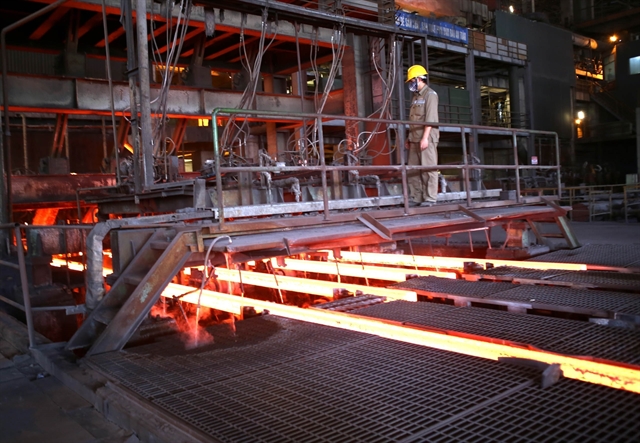 Economy
Economy


|
| A worker operates machines at the Hòa Phát Hải Dương Steelmill. — VNA/VNS Photo |
HÀ NỘI — International free trade agreements such as the Comprehensive and Progressive Agreement for Trans-Pacific Partnership (CPTPP) and the EU-Vietnam Free Trade Agreement (EVFTA) have opened up unprecedented opportunities for Vietnamese steelmakers with the industry forecast to see robust growth.
Opportunities, however, will come with challenges as the country’s steel exports have found. A rise in trade protectionism in large markets such as the US and the EU were among the most difficult tasks Vietnamese steelmakers must address.
For instance, the US Department of Commerce (DOC) had slapped duties of up to 456 per cent on a number of steel products from Việt Nam including corrosion-resistant steel and cold-rolled steel with S Korean or Taiwanese origin, which had allegedly circumvented US anti-dumping and anti-subsidy duties, according to the department.
The DOC said it had observed a sharp increase in shipments of corrosion-resistant steel (332 per cent) and cold-rolled steel (916 per cent) from Việt Nam from 2016-19 compared to previous years since the US started imposing duties on S Korean and Taiwanese steel products in December 2015 and February 2016.
The heavy duties imposed by the US has seen Vietnamese steel export to the world’s largest economy drop to just over $3.49 billion, a 9 per cent decrease from the same period last year.
Industry expert Nguyễn Văn Sưa said the gloomy figure was a result of US-China trade tensions as the US ramped up efforts to counter origin fraud. Other countries were likely to take similar actions to protect their own steel industries.
“If we fail to fight off origin fraud among Vietnamese steelmakers, our products will face even higher tariffs in the US and traditional markets including ASEAN countries,” said Sưa.
In addition, the price of Vietnamese steel products has been on the decline during the last ten months of the year, fetching just over $648 per tonne, an 11.4 per cent drop compared to 2018.
This price drop combined with rising protectionism and stricter scrutiny may prove to be daunting challenges for Vietnamese firms to overcome in order to maintain and boost their exports.
A representative from Hoa Phat Group – one of the country’s largest steelmakers – said origin fraud damaged the country’s image and hurt Vietnamese steel’s ability to compete effectively in the long run as more countries would likely put Vietnamese product on their watch-lists or impose higher duties.
Chu Thắng Chung, deputy head of the trade remedies authority under the Ministry of Industry and Trade, said only a handful number of Vietnamese steel makers had engaged in origin fraud. While yielding short-term benefits for a few, it would cause significant financial damage to others trying to meet stricter regulations in import markets.
The ministry said it would continue to support Vietnamese firms to cope with trade protection measures. It also urged Vietnamese firms to buy input materials from domestic firms to avoid over-reliance on outside sources. — VNS